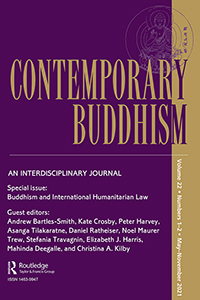- 充值
- 帮助

Contemporary Buddhism is an international, Thomson Reuters-indexed journal that publishes articles on the current state and influence of Buddhism. The journal is cross-disciplinary in its outlook and in addition to Buddhist and Religious Studies approaches, presents work from philosophers, anthropologists, psychologists, sociologists, historians, theologians, political scientists and other disciplines. Contemporary Buddhism examines the historical, doctrinal, literary, social, political, developments that have formed contemporary versions of Buddhism, East and West. In all this Buddhism is predicated as an inhabited and relevant action-influencing worldview. The interests of Contemporary Buddhism include: the meeting of Buddhism with western culture • the current self-understanding of different traditions of Buddhism and the relations between these traditions • the relations of Buddhism to other world religious traditions, both in mutual appreciation and in conflict • Buddhism in application within societies, Western and Asian • the uptake of Buddhism into other fields and disciplines • spotlighting issues arising for Buddhism in the 21st century • the non-partisan representation of all schools of Buddhism • the active investigation of diversity in the development of Buddhism as we see it today. Submissions of papers, as well as proposals for guest issues, related to the of the journal are welcomed. The journal will publish reviews of books, including reviews of non-English language books, films, exhibitions, internet resources, etc. The reviews editor also welcomes proposals for bibliographic essays on specific topics and areas, as well as reports on specific genres. A Practical and Intellectual Agenda A statement of the ideas that inspired the creation of Contemporary Buddhism by Michael McGhee is: “The time has long since gone when the study of Buddhism in the West was the preserve of a few scholars, or its influence confined to a handful of European intellectuals. The time is long since too when Buddhist practice in the West was a polite genuflection, 'meditation' merely the occasional ancillary to a self defining intellectual conviction. Popular perception has altered too, and we are familiar now with Buddhist chic, with the movie stars photographed with smiling Lamas. But the current reality has become very interesting...” Peer Review Policy All research articles considered for publication are subject to anonymized peer review.Authors can choose to publish gold open access in this journal.
- 主办单位: ROUTLEDGE JOURNALS, TAYLOR & FRANCIS LTD
- 出版地区: United Kingdom
- 出版周期: 年2期
- 国际标准连续出版物号: ISSN 1463-9947
- 创刊时间: 2000年
-
vol.24 (2024)
vol.24 (2024)
1-2 -
vol.24 (2023)
vol.24 (2023)
-
vol.23 (2023)
vol.23 (2023)
-
vol.23 (2022)
vol.23 (2022)
-
vol.22 (2021)
vol.22 (2021)
-
vol.21 (2020)
vol.21 (2020)
-
vol.20 (2019)
vol.20 (2019)
-
vol.19 (2018)
vol.19 (2018)
-
vol.18 (2017)
vol.18 (2017)
-
vol.17 (2016)
vol.17 (2016)
-
vol.16 (2015)
vol.16 (2015)
-
vol.15 (2014)
vol.15 (2014)
-
vol.14 (2013)
vol.14 (2013)
-
vol.13 (2012)
vol.13 (2012)
-
vol.12 (2011)
vol.12 (2011)
-
vol.11 (2010)
vol.11 (2010)
-
vol.10 (2009)
vol.10 (2009)
-
vol.9 (2008)
vol.9 (2008)
-
vol.8 (2007)
vol.8 (2007)
-
vol.4 (2003)
vol.4 (2003)
-
vol.3 (2002)
vol.3 (2002)
-
vol.2 (2001)
vol.2 (2001)
-
vol.1 (2000)
vol.1 (2000)
- 1
- 2
- 3

 分析评价
分析评价
